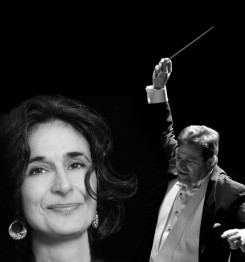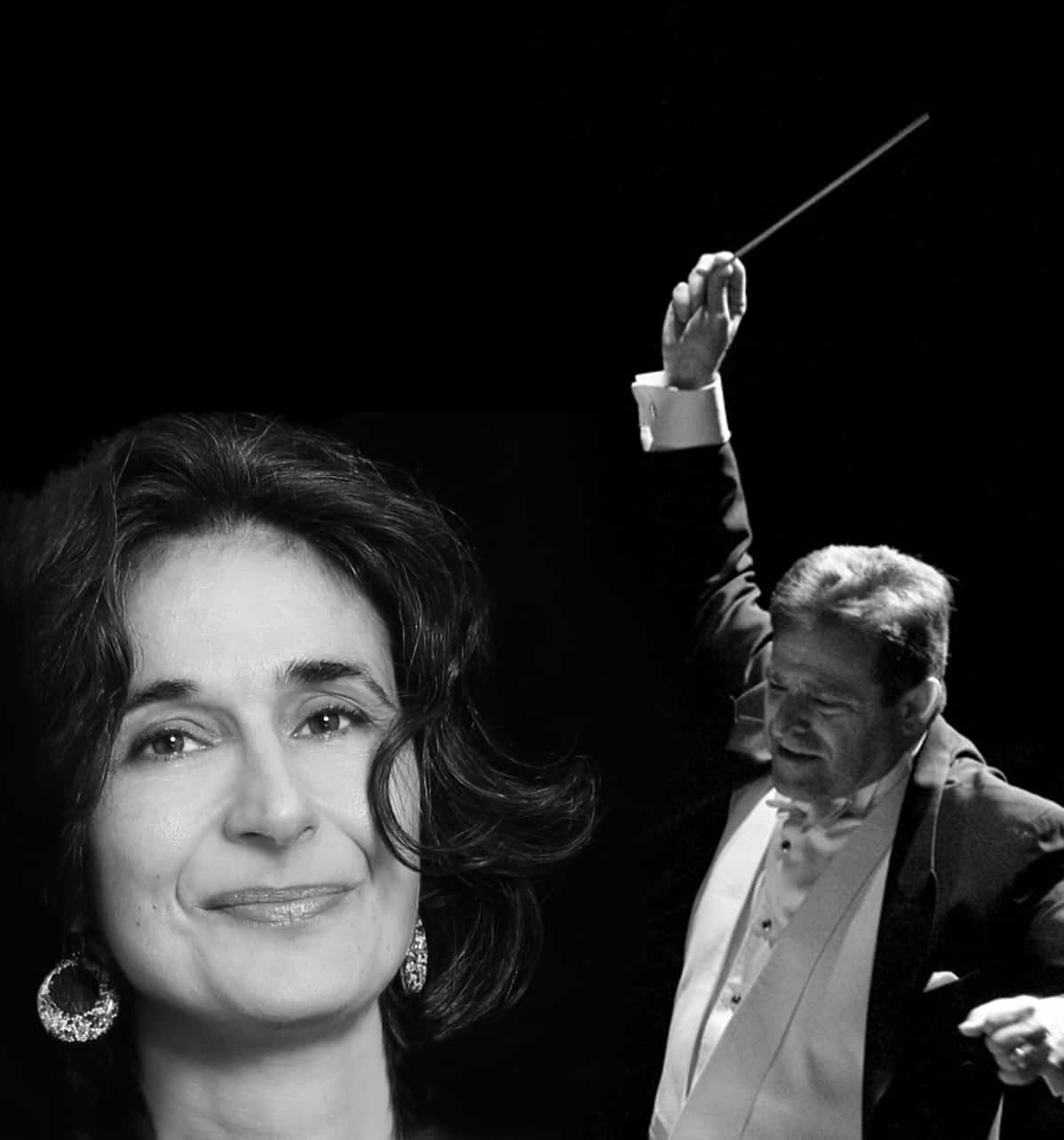What qualifies as dialogue? We refer to many things as dialogue: a conversation between two people, two nations signalling willingness to work together, or something more abstract, an exchange of ideas or spirits. Yet dialogue also exists in concert music, from how a score opens up a conversation between multiple subjects — composer, musician, conductor, and audience. To explore where and how this exchange happens in concert music, I spoke to conductor David Briskin and pianist Eve Egoyan.
 Briskin is currently the music director and principal conductor of The National Ballet of Canada, as well as the director of orchestral studies and assistant professor at the university’s Faculty of Music. He has worked with orchestral ensembles all over the world and spent 23 years conducting and teaching in New York before moving to Toronto. Though trained in standard classical repertoire, Egoyan specializes in contemporary music and has vast experience improvisation and collaborating with other artists. Their interviews took place separately and are presented together below.
Briskin is currently the music director and principal conductor of The National Ballet of Canada, as well as the director of orchestral studies and assistant professor at the university’s Faculty of Music. He has worked with orchestral ensembles all over the world and spent 23 years conducting and teaching in New York before moving to Toronto. Though trained in standard classical repertoire, Egoyan specializes in contemporary music and has vast experience improvisation and collaborating with other artists. Their interviews took place separately and are presented together below.
The Varsity
In the documentary The Art of Conducting, one person says that the conductor has a desired outcome in his head while he conducts, and he listens whether this matches up with what is being delivered. Is the orchestra ultimately a tool for the composer’s artistic vision? Or is there some kind of dialogue?
David Briskin
I think that description is very good. One of the roles of the conductor is to come to a point of view, to convey that point of view to the orchestra and to essentially build consensus. That is what we’re ultimately trying to do, we’re trying to get 90 people on the same page in service to the music. But I think that the idea of dialogue goes beyond the kind of mediation by the conductor, because what happens in the orchestra is, and this isn’t talked about as much, there is constant communication amongst members of the orchestra, [mostly] non-verbal, it’s in the eyes. The conductor needs to know when to speak and when to listen, if you will. Musicians sometimes will come up and say, ‘Thank you for letting us play,’ which means getting out of the way and letting them communicate and guiding the certain terms where necessary.
The Varsity
How is it for you as a pianist?
Eve Egoyan
It depends on the composer, it depends on the work. In contemporary music practices, especially when a work has been written with me in mind, that person has an idea of my sound and my imagination. It’s like something custom-fitted. Rather than buying a piece of clothing from a regular store, this piece of clothing has been made for you. There’s also more flexibility in the dialogue between the living composer and the living performer. Often within a score there will be room for the performer to actually make decisions for themselves and be more of a creative partner… I’ll have something in mind, it’s a combination of what I see and what I imagine and what I hear that my instrument is capable of. And in live performance that changes, which is wonderful, because you prepare yourself to a certain point but then you’re in a hall with a different piano, different acoustic space, and your audience. So the audience is interacting, too — their listening informs my listening. And it does feel like a different type of collaboration at that point.
The Varsity
My next question was going to be whether the audience adds anything to the dialogue you have created with the composer at that point, so I guess it does.
Eve Egoyan
Yes, for me, I invite that, because I enjoy that feeling of connection with my audience and I like to feel that that moment is that moment and it’s a communal thing. And it’s actually a very sacred place. The thing about concert music is you’re expecting your audience to be there, sitting there quietly and receiving, in a way. That’s very important as a performer, that what is being shared is a positive energy because it is just something moving through time. It’s not tangible, so I feel that I need to respect that, their openness.
The Varsity
David, you have to communicate the idea you have of another person’s composition to the orchestra so that they can communicate this mediated idea to an audience of listeners. Do you find that challenging?
David Briskin
It’s very challenging but it’s incredibly rewarding. It’s a great privilege to have a life in music, you know. The reward comes through a beautiful performance and to be able to touch other people and to inspire them and to engage them. That’s what we’re trying to do. An orchestra can play in a rehearsal without an audience and it’s all fine, but when you have the audience it completely changes the way you approach it.
The Varsity
Musical notation directs a piece but there is room for interpretation. Is this space the realm in which you enter a dialogue with the composer?
Eve Egoyan
Well, you have to think or imagine if you’re a composer why would you want to give up a certain amount of control? A composer uses notation only as a medium. I mean, if they didn’t want to risk the translation they wouldn’t be doing that as an art form. The score is not an exact map. It’s a map, but it’s not finished and it can’t be because you can’t notate every single detail. It is actually the play on the score that is an invitation for that live moment. So you’re inviting the personality of your interpreter; the personality of their instrument; where this thing is going to be performed; whether it’s outside versus a hall versus a café; and an audience, whether they’re attentive.
The Varsity
I never thought that a composer would want to give up control at some point. I think of a composer as having an exact idea of what it is they want to hear and just writing that down, and in the process of somebody taking that on it inevitably changes.
Eve Egoyan
I think that would make for a very bad composer, actually. I suppose it’s similar to writing a play. You know, somebody writes these words but every time it’s being read it’s being interpreted differently. You’d say that’s fixed, but there are so many variables and nothing is exact.
David Briskin
There’s a wonderful book by a conductor, Erich Leinsdorf, and he wrote The Composer’s Advocate, a book about conducting. You have to advocate for the composer through what he or she has left behind. It’s different when you have a living composer and working together on something. The composer has an idea and imagines sounds, especially in orchestral music, musical ideas that are spread on a large group of instruments. When you really put things together it’s almost like cooking; you’re putting things together, you’re mixing things up.
The Varsity
Many people think all there is to conducting is dressing up in a suit and wiggling a stick to tell the orchestra what the composer wants them to do.
David Briskin
That is exactly what it looks like. It really does [laughs]. I think that a conductor is more like a lexical conductor. It’s a piece of circuitry connecting every member of the orchestra with every member of the audience. It’s like electricity, if one electrical conductor is not working then it stops, right? So that’s what a conductor really does. It’s interesting because [beyond] the rehearsal process of teaching the orchestra about my own idea of the musical work representing the composer’s intentions, which everyone has in front of them on the music, ultimately a performance is a completely non-verbal art form. You mostly communicate through gesture and through the eyes what you’d like to hear. What’s remarkable is how much things can change by not saying anything, but just by just moving in a different way.
The Varsity
Eve, once you take on a piece, how do you enter a dialogue with the composer? Do you choose it by feeling a connection to it?
Eve Egoyan
Or a composer who I’m connecting to, who I would like to work with, or they come to me and I decide I would like that to happen. It depends, there can be a dialogue. Usually what happens is I’ll learn the piece and if they’re not in town I will send a recording of my rehearsal process and then one before it goes into performance. So there’s a discussion.
The Varsity
Do you prefer to work with a living composer, as opposed to taking on a piece that was written decades or centuries ago?
David Briskin
I think that’s the most exciting thing. The liturgy of our repertoire comes from the past. With orchestral music it forms kind of a canon of classical music. So the opportunity to do new music, especially to work with the composer, is great.
Eve Egoyan
Part of the reason why I play contemporary music is that I have the freedom to feel I’m close to the original idea. I’m not guessing. And I’m not superimposing.


